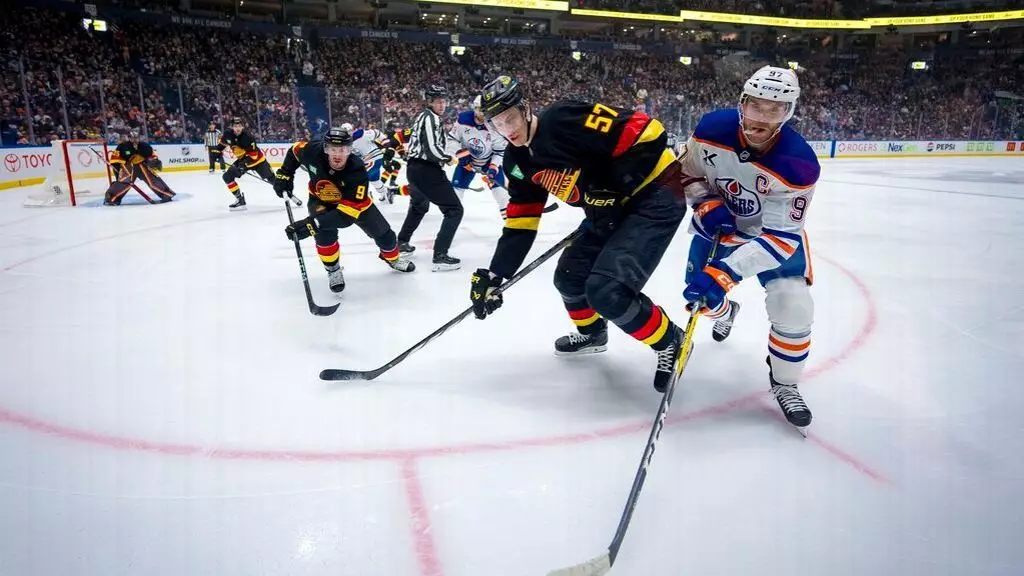In a surprising turn of events following the latest match between the Edmonton Oilers and the Vancouver Canucks, two of the NHL’s more prominent figures—Connor McDavid and Tyler Myers—have received three-game suspensions for their aggressive conduct on the ice. This incident speaks volumes not only about the physical nature of hockey but also raises questions regarding player safety and disciplinary measures within the league.
The game on Saturday night showcased a competitive spirit that ultimately led to a breakdown in discipline for both players. In a heated moment late in the third period, with the Canucks leading 3-2, McDavid and Canucks forward Conor Garland engaged in a tussle that turned aggressive when McDavid retaliated with a cross-check to Garland’s head. In the same vein, just moments later, Myers followed suit by delivering a similar penalty to Oilers defenseman Evan Bouchard. Both players were handed match penalties, signaling a clear breach of conduct that warranted subsequent review by the NHL’s Department of Player Safety.
The heart of the issue seems to revolve around the mounting pressure and frustration that players experience during high-stakes matches. McDavid’s actions were described by Oilers coach Kris Knoblauch as an outburst of frustration, a reaction to being held back by Garland as he attempted to make a play. “Connor gets frustrated and he gets his stick up,” Knoblauch noted, underscoring how even the most skilled player can succumb to moments of indiscretion when the stakes are high.
The NHL’s Department of Player Safety takes player safety seriously, especially when head-related incidents are involved. In their analysis, the Department characterized McDavid’s action not as a typical hockey play but as an intentional act of aggression designed to escalate a physical confrontation. They specifically criticized McDavid for elevating his stick to make contact with Garland’s head. This documentation sets a clear precedent for what constitutes dangerous play, regardless of a player’s stature or previous conduct in the league.
Both McDavid and Myers now find themselves facing the consequences of their actions. This suspension is particularly significant for McDavid; it marks the longest pause in play for the player during his celebrated career. Surprising to many, given his status as a three-time Hart Trophy winner, this situation serves as a reminder that even elite athletes are subject to the same rules as everyone else.
In an extraordinary twist, neither player will be present in the lineup for their next match, a scheduled rematch between the two teams. This absence not only diminishes the excitement of the game but also impacts the strategies both coaches will have to adopt moving forward.
The Implications of Player Behavior
The ramifications of this incident extend beyond immediate penalties and suspensions. Both players will forfeit portions of their salaries, which will contribute to the Players’ Emergency Assistance Fund. McDavid’s forfeiture of over $195,000 and Myers’ loss of nearly $47,000 serves as a financial reminder that misbehavior has tangible consequences.
What can the league learn from this incident? It highlights the challenge of managing player emotions, particularly those of star players like McDavid, who carry the burden of high expectations. Many fans and analysts have emphasized the need for proper channels to address frustrations that lead to dangerous behavior, perhaps advocating for more robust officiating to manage similar situations before they escalate to punitive actions.
As both players navigate their suspensions, they have an opportunity to reflect on their actions and the broader implications of their behavior for the sport. The conversation surrounding player safety continues to be a pressing concern in the NHL, and incidents like this may prompt further evaluation of disciplinary measures and safety protocols.
For fans of the game, both players’ absences will be felt. McDavid, who is currently ranked fourth in league scoring, is a potent force on the ice, and watching the Oilers compete without him will test their resilience. Similarly, Myers has been significant in Vancouver’s defensive strategy, and his suspension could leave a noticeable gap in their lineup.
Ultimately, moments like this remind us that hockey is not merely a sport of physical agility and tactics; it is also one of emotional volatility. Managing that volatility is as critical as executing the game plan on the ice, and the NHL must strive for a balance that protects players while preserving the spirit of the game.

